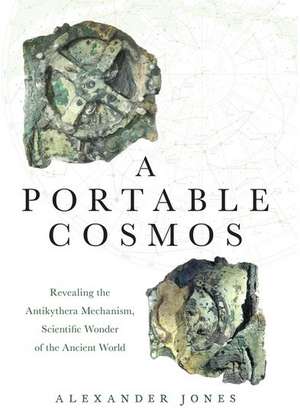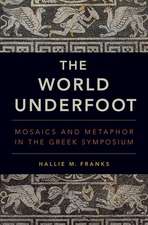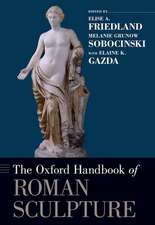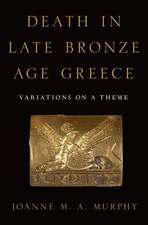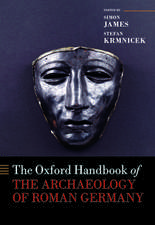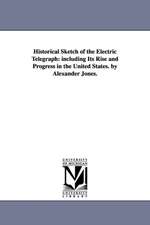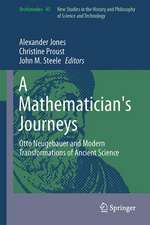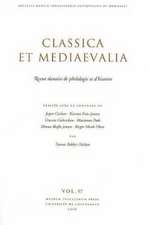A Portable Cosmos: Revealing the Antikythera Mechanism, Scientific Wonder of the Ancient World
Autor Alexander Jonesen Limba Engleză Paperback – 8 aug 2019
| Toate formatele și edițiile | Preț | Express |
|---|---|---|
| Paperback (1) | 123.60 lei 10-16 zile | |
| Oxford University Press – 8 aug 2019 | 123.60 lei 10-16 zile | |
| Hardback (1) | 391.31 lei 3-5 săpt. | |
| Oxford University Press – 23 mar 2017 | 391.31 lei 3-5 săpt. |
Preț: 123.60 lei
Preț vechi: 148.29 lei
-17% Nou
Puncte Express: 185
Preț estimativ în valută:
23.65€ • 25.68$ • 19.87£
23.65€ • 25.68$ • 19.87£
Carte disponibilă
Livrare economică 21-27 martie
Preluare comenzi: 021 569.72.76
Specificații
ISBN-13: 9780190931490
ISBN-10: 0190931493
Pagini: 312
Ilustrații: 41 black-and-white illus. & 41 black-and-white line drawings
Dimensiuni: 155 x 229 x 18 mm
Greutate: 0.43 kg
Editura: Oxford University Press
Colecția OUP USA
Locul publicării:New York, United States
ISBN-10: 0190931493
Pagini: 312
Ilustrații: 41 black-and-white illus. & 41 black-and-white line drawings
Dimensiuni: 155 x 229 x 18 mm
Greutate: 0.43 kg
Editura: Oxford University Press
Colecția OUP USA
Locul publicării:New York, United States
Recenzii
This book will be invaluable to those engaged in the study of the science of the ancient Greeks and Romans. Endnotes and references will assist individuals who wish to delve into further research. The presented black-and-white photographs and drawings are essential to understanding the work's subject matter. ... Summing Up: Recommended. Graduate students, faculty, and professionals.
[Jones] presents a very readable account of the Mechanism, and the consensus of what it was used for... [An] excellent 'User Manual.'
Jones has, in short, produced a superb guide to this dazzling embodiment of ancient astronomical knowledge and mechanical technology. Detailed enough that even scholars of ancient science will learn much, yet readable enough that undergraduate students will find it approachable (I myself have tested out both audiences), this book ends the long wait for a thorough, reliable, and accessible guide to the Antikythera Mechanism.
The book is a triumph at several levels, as an account of high-grade detective work, as an exposition of ancient astronomical ideas, and as a disquisition on where those ideas fitted into the society that produced them.... This is recommended reading for anyone interested in ancient astronomy.
Jones' book is written in such a way that makes it profitable reading for a wide range of readers, from the specialists on the Mechanism to those who have never heard of it. It presents in detail and explains clearly and in a pleasant way the Mechanism and its context by using all the existing specialised literature: this is really the Bible of the Antikythera Mechanism. The only recommendation to the unprepared reader is to use the book with moderation. One can easily become addicted to the Antikythera Mechanism, this absolute technical marvel of Antiquity, and dedicate oneself to the endless search for its lost planetary gear trains.
Jones's text, too, is precise but calm, elegant and with a certain charm. His learning is broad: here's Ptolemy, here are gear ratios, here's Cicero and Galen, Babylonians, planets, lunar months, Glauco, epicyclics and the 'Spindle of Necessity'. And it is not just the cosmos that is demonstrated, but the vast difference, and astonishing similarity, between us and our ancestors. So out of the history of science comes a sense of our humanity and the ancient desire to comprehend. God knows, it's timely, in the shrivelled cosmos we are building. We need more books like this. And probably more sponge-divers, too.
A historian of science and technology, Mr. Jones played a role in this endeavor. His job was to link the complexities of the Antikythera Mechanism to what the ancient Greeks believed about the astronomy of a geocentric universe. His virtue as an author is an exhaustive knowledge of his subject, such as how Greek calendars varied from city to city and how pre-Copernican astral calculations accounted for the mystery of the planets' retrograde motion...Mr. Jones can be refreshingly candid, avoiding scholarly habits of overcaution.
A Portable Cosmos is a fine account of everything that pertains to the Antikythera mechanism-the story of its discovery and decipherment, the scholarly debates about its date and provenance, and the meanings it would have held for an ancient viewer. The book is notable for its sweep, and the ease with which it moves back and forth among ancient literature, the phenomena of astronomy, and the mechanical details of the surviving artifact. This is a gem of a book.
My major contribution to this amazing lost-and-found story occurred when I was asked to referee a paper on the remarkable Antikythera Mechanism, which had been recovered from an ancient ship wreck. I told them, 'You should really ask Alexander Jones.' They did, and the unexpected result was that Jones, an outstanding scholar and an expert in both ancient Greek and antique astronomy, was invited to join the team. Here Jones describes the long and fascinating path to decipherment in the decades since the device was found by divers in 1900.
Alexander Jones has done a huge service with A Portable Cosmos, dispelling many of the myths associated with this fascinating artifact... he has provided an engagingly written and detailed history of the Mechanism, covering the discovery itself, research undertaken to date, the ancient scientific and technological expertise underpinning the object and the cultural contexts of the Greco-Roman world in which it was made and meant to be used. Jones persuasively argues that the Mechanism was intended as an educational tool, rather than a specialist bit of kit...its intended audience may have been the ancient counterpart to those readers who will be drawn to Jones' authoritative and insightful account. A Portable Cosmos is set to become the definitive history of the Antikythera Mechanism, and will be of great value to specialists, as well as students and those interested in ancient Greco-Roman science and technology.
Alexander Jones' comprehensive look at the Antikythera mechanism and its context will suit readers interested in the mechanism or the history of science in general.
A Portable Cosmos is both an excellent focussed case study of an individual object and a comprehensive broader treatment of the relevant aspects of ancient science and technology. It is beautifully and thoughtfully illustrated, with numerous diagrams and photographs placed strategically throughout, not just of the mechanism but of various other relevant ancient objects such as calendar and other almanac-style parapegma inscriptions, manuscripts, astrolabes etc. I shall definitely be adding it to the syllabi of my 'Nature and the Natural World in Antiquity' and 'Ancient Technology' courses, and I recommend that other instructors do the same.
[Jones] presents a very readable account of the Mechanism, and the consensus of what it was used for... [An] excellent 'User Manual.'
Jones has, in short, produced a superb guide to this dazzling embodiment of ancient astronomical knowledge and mechanical technology. Detailed enough that even scholars of ancient science will learn much, yet readable enough that undergraduate students will find it approachable (I myself have tested out both audiences), this book ends the long wait for a thorough, reliable, and accessible guide to the Antikythera Mechanism.
The book is a triumph at several levels, as an account of high-grade detective work, as an exposition of ancient astronomical ideas, and as a disquisition on where those ideas fitted into the society that produced them.... This is recommended reading for anyone interested in ancient astronomy.
Jones' book is written in such a way that makes it profitable reading for a wide range of readers, from the specialists on the Mechanism to those who have never heard of it. It presents in detail and explains clearly and in a pleasant way the Mechanism and its context by using all the existing specialised literature: this is really the Bible of the Antikythera Mechanism. The only recommendation to the unprepared reader is to use the book with moderation. One can easily become addicted to the Antikythera Mechanism, this absolute technical marvel of Antiquity, and dedicate oneself to the endless search for its lost planetary gear trains.
Jones's text, too, is precise but calm, elegant and with a certain charm. His learning is broad: here's Ptolemy, here are gear ratios, here's Cicero and Galen, Babylonians, planets, lunar months, Glauco, epicyclics and the 'Spindle of Necessity'. And it is not just the cosmos that is demonstrated, but the vast difference, and astonishing similarity, between us and our ancestors. So out of the history of science comes a sense of our humanity and the ancient desire to comprehend. God knows, it's timely, in the shrivelled cosmos we are building. We need more books like this. And probably more sponge-divers, too.
A historian of science and technology, Mr. Jones played a role in this endeavor. His job was to link the complexities of the Antikythera Mechanism to what the ancient Greeks believed about the astronomy of a geocentric universe. His virtue as an author is an exhaustive knowledge of his subject, such as how Greek calendars varied from city to city and how pre-Copernican astral calculations accounted for the mystery of the planets' retrograde motion...Mr. Jones can be refreshingly candid, avoiding scholarly habits of overcaution.
A Portable Cosmos is a fine account of everything that pertains to the Antikythera mechanism-the story of its discovery and decipherment, the scholarly debates about its date and provenance, and the meanings it would have held for an ancient viewer. The book is notable for its sweep, and the ease with which it moves back and forth among ancient literature, the phenomena of astronomy, and the mechanical details of the surviving artifact. This is a gem of a book.
My major contribution to this amazing lost-and-found story occurred when I was asked to referee a paper on the remarkable Antikythera Mechanism, which had been recovered from an ancient ship wreck. I told them, 'You should really ask Alexander Jones.' They did, and the unexpected result was that Jones, an outstanding scholar and an expert in both ancient Greek and antique astronomy, was invited to join the team. Here Jones describes the long and fascinating path to decipherment in the decades since the device was found by divers in 1900.
Alexander Jones has done a huge service with A Portable Cosmos, dispelling many of the myths associated with this fascinating artifact... he has provided an engagingly written and detailed history of the Mechanism, covering the discovery itself, research undertaken to date, the ancient scientific and technological expertise underpinning the object and the cultural contexts of the Greco-Roman world in which it was made and meant to be used. Jones persuasively argues that the Mechanism was intended as an educational tool, rather than a specialist bit of kit...its intended audience may have been the ancient counterpart to those readers who will be drawn to Jones' authoritative and insightful account. A Portable Cosmos is set to become the definitive history of the Antikythera Mechanism, and will be of great value to specialists, as well as students and those interested in ancient Greco-Roman science and technology.
Alexander Jones' comprehensive look at the Antikythera mechanism and its context will suit readers interested in the mechanism or the history of science in general.
A Portable Cosmos is both an excellent focussed case study of an individual object and a comprehensive broader treatment of the relevant aspects of ancient science and technology. It is beautifully and thoughtfully illustrated, with numerous diagrams and photographs placed strategically throughout, not just of the mechanism but of various other relevant ancient objects such as calendar and other almanac-style parapegma inscriptions, manuscripts, astrolabes etc. I shall definitely be adding it to the syllabi of my 'Nature and the Natural World in Antiquity' and 'Ancient Technology' courses, and I recommend that other instructors do the same.
Notă biografică
Alexander Jones is Professor of the History of the Exact Sciences in Antiquity at New York University's Institute for the Study of the Ancient World.
